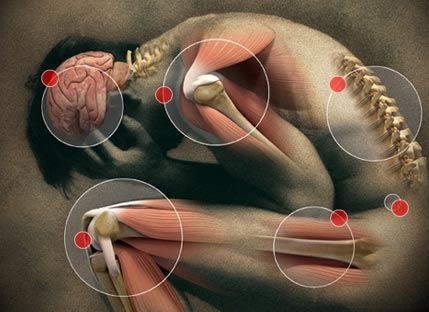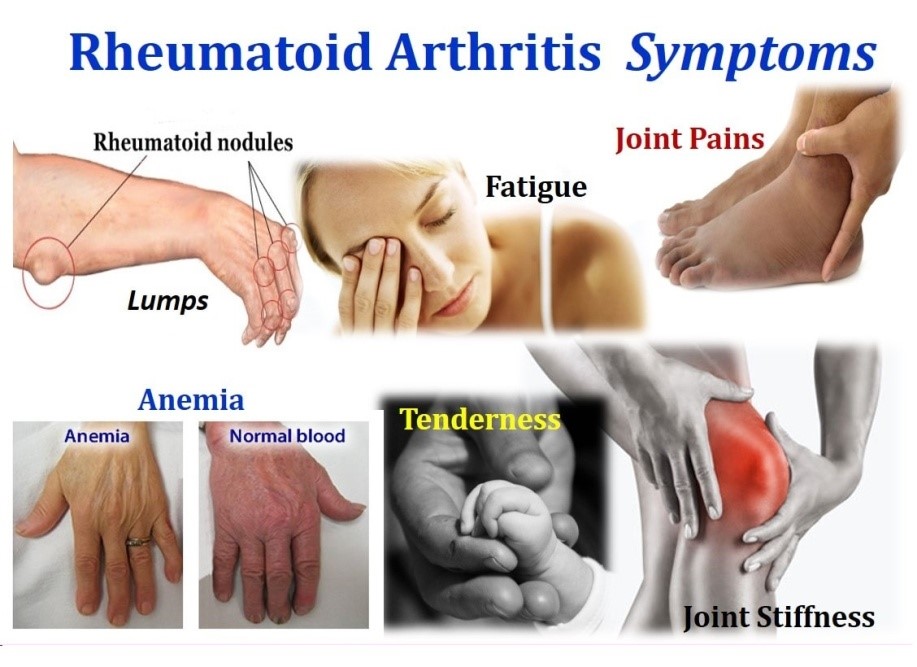
 Rheumatoid arthritis is an autoimmune and inflammatory disease that occurs when the immune system
mistakenly attacks healthy cells in the body, leading to inflammation and painful swelling in
affected areas. Different types of rheumatoid arthritis typically attack multiple joints
simultaneously, with common locations including the hands, wrists, and knees. Rheumatoid
arthritis knee is a common condition giving severe pain. In the affected joints, the lining
becomes inflamed, resulting in damage to joint tissue that can cause chronic pain, lack of
balance, and misshapenness. Additionally, RA can impact other tissues in the body and lead to
complications in organs such as the lungs, heart, and eyes. Osteoarthritis and rheumatic
arthritis both result in inflammation and pain. However, osteoarthritis occurs when the smooth
cartilage joint surface wears out.
Rheumatoid arthritis is an autoimmune and inflammatory disease that occurs when the immune system
mistakenly attacks healthy cells in the body, leading to inflammation and painful swelling in
affected areas. Different types of rheumatoid arthritis typically attack multiple joints
simultaneously, with common locations including the hands, wrists, and knees. Rheumatoid
arthritis knee is a common condition giving severe pain. In the affected joints, the lining
becomes inflamed, resulting in damage to joint tissue that can cause chronic pain, lack of
balance, and misshapenness. Additionally, RA can impact other tissues in the body and lead to
complications in organs such as the lungs, heart, and eyes. Osteoarthritis and rheumatic
arthritis both result in inflammation and pain. However, osteoarthritis occurs when the smooth
cartilage joint surface wears out.
Osteoarthritis usually begins in an isolated joint. Rheumatoid arthritis is an autoimmune disease, which means that the immune system malfunctions and attacks the body instead of intruders.
 RA being
inflammatory arthritis symptoms may get worse, known as flares, and times when symptoms
get better, known as remission. Patients may have stiffness in more than one joint, pain or aching in more than one joint, tenderness and swelling in more than one joint, fever,
fatigue or tiredness, weight loss, and weakness.
RA being
inflammatory arthritis symptoms may get worse, known as flares, and times when symptoms
get better, known as remission. Patients may have stiffness in more than one joint, pain or aching in more than one joint, tenderness and swelling in more than one joint, fever,
fatigue or tiredness, weight loss, and weakness.
RA is the result of an immune response in which the body's immune system attacks its healthy cells. The specific causes of RA are unknown, but some factors can increase the risk of developing the disease.
RA is diagnosed by reviewing symptoms, conducting a physical examination, and doing X-rays and lab tests like RA factor. It’s best to diagnose RA early within 6 months of the onset of symptoms so that people with the disease can begin treatment to slow or stop disease progression (for example, damage to joints). Diagnosis and effective treatments, particularly treatment to suppress or control inflammation, can help reduce the damaging effects of RA.
RA can be effectively treated and managed with medication(s) and self-management strategies. RA factor rheumatology treatment usually includes the use of medications that slow the disease and prevent joint deformity, called disease-modifying antirheumatic drugs (DMARDs); biological response modifiers (biologicals) are medications that are an effective second-line treatment. In addition to medications, people can manage their RA with self-management strategies proven to reduce pain and disability, allowing them to pursue the activities important to them.
Although there's no rheumatoid arthritis cure, early treatment and support (including medicine, lifestyle changes, supportive treatments, and surgery) can reduce the risk of joint damage and limit the impact of the condition. Your treatment will usually involve care from your GP and several different specialists.
Acupuncture for rheumatoid arthritis is the treatment of first choice options which can give a fairly good response. At our Dr. Pardeshi Acupuncture we have been treating rheumatoid arthritis successfully. If you have any question in this regard ring 9823033415
“Ten trials representing 1456 participants met the inclusion criteria and were analyzed. These studies provide evidence that acupuncture is an effective treatment for pain and physical dysfunction associated with osteoarthritis of the knee.”
“Conclusion Acupuncture is an effective treatment for osteoarthritis of the knee. Its overall effect size is 0.8, and it can be considered instead of non-steroidal anti-inflammatory drugs for patients whose symptoms are not controlled by education, exercise, weight loss if appropriate and simple analgesics.”